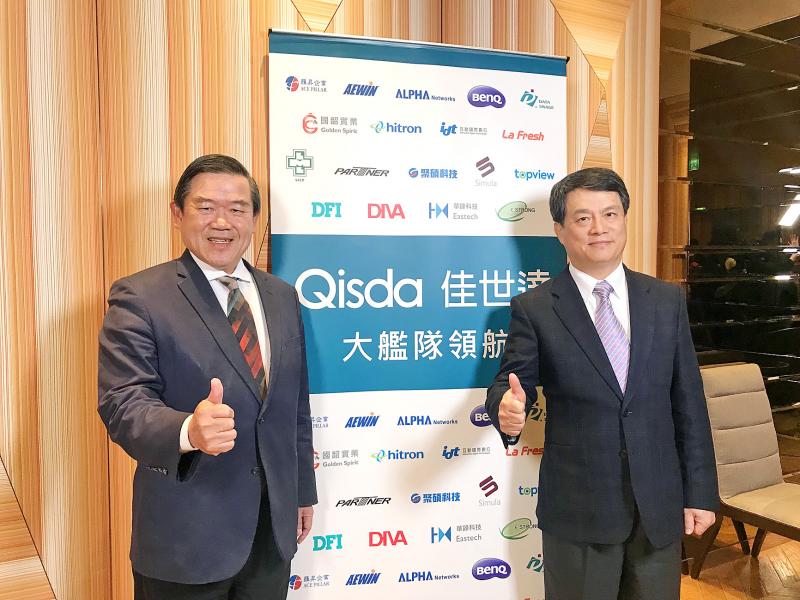Electronics maker Qisda Corp (佳世達) and TCI Co (大江生醫), which manufactures health food, functional beverages and skincare products, on Friday said that they would form a strategic alliance through a private placement.
Under the deal, Qisda plans to acquire 4.72 million shares in a TCI subsidiary, TCI Gene Inc (大江基因), at NT$115.5 per share, the company’s regulatory filing showed on Friday.
TCI Gene is mainly engaged in the research and manufacturing of various genetic testing, stem cell and immune cell products.

Photo: Chen Mei-ying, Taipei Times
The NT$545.16 million (US$18.38 million) investment would allow Qisda to hold a 17.84 percent stake in TCI Gene, using its own capital to fund the deal, the filing said.
“To strengthen the company’s biotechnology business, Qisda has stepped into the field of precision medicine,” the company said in the filing. “Through this investment, we will complement each other’s resources, expand the biotechnology and medical care business, and provide customers with a wider range of products and services.”
Qisda manufactures computer accessories, communication devices and consumer electronics. It also provides consulting and technical services, and has cultivated a high-value-added medical business, which has been the firm’s best performer during the COVID-19 pandemic.
Precision medicine is an emerging model in which precise detection prevents diseases in their early stages, and treats them with specific medicines. The practice provides treatment that most accurately minimizes adverse drug reactions and avoids wasting medical resources, it said.
A PricewaterhouseCoopers report on the precision health industry said that the market is forecast to grow from US$68.3 billion in 2020 to US$134.4 billion in 2025, with a compound annual growth rate of 14 percent.
The genetic testing market, which is the basis of precision medicine, has attracted much attention, Qisda said.
The market potential for this segment is predicted to grow from US$8 billion last year to US$15.8 billion in 2030, with compound growth of 7.6 percent, it said, citing data from Precedence Research.
The application of cell therapy in precision medicine should also have high growth potential, it added.
Precision medicine is an emerging business suitable for technology firms, as it is expected to integrate new technologies such as genetic testing, immune cell therapy and artificial intelligence, Qisda chairman Peter Chen (陳其宏) said.
“We look forward to providing more accurate preventive medicine, precise diagnosis and treatment services to the public through cooperation with TCI Group (大江生醫集團),” Chen said in a statement.
TCI Group chairman Vincent Lin (林詠翔) said he expects to leverage the strength of Qisda in medical services, equipment, pharmaceutical access and big data solutions to increase TCI Gene’s products and testing services.

Macronix International Co (旺宏), the world’s biggest NOR flash memory supplier, yesterday said it would spend NT$22 billion (US$699.1 million) on capacity expansion this year to increase its production of mid-to-low-density memory chips as the world’s major memorychip suppliers are phasing out the market. The company said its planned capital expenditures are about 11 times higher than the NT$1.8 billion it spent on new facilities and equipment last year. A majority of this year’s outlay would be allocated to step up capacity of multi-level cell (MLC) NAND flash memory chips, which are used in embedded multimedia cards (eMMC), a managed

In Italy’s storied gold-making hubs, jewelers are reworking their designs to trim gold content as they race to blunt the effect of record prices and appeal to shoppers watching their budgets. Gold prices hit a record high on Thursday, surging near US$5,600 an ounce, more than double a year ago as geopolitical concerns and jitters over trade pushed investors toward the safe-haven asset. The rally is putting undue pressure on small artisans as they face mounting demands from customers, including international brands, to produce cheaper items, from signature pieces to wedding rings, according to interviews with four independent jewelers in Italy’s main

CULPRITS: Factors that affected the slip included falling global crude oil prices, wait-and-see consumer attitudes due to US tariffs and a different Lunar New Year holiday schedule Taiwan’s retail sales ended a nine-year growth streak last year, slipping 0.2 percent from a year earlier as uncertainty over US tariff policies affected demand for durable goods, data released on Friday by the Ministry of Economic Affairs showed. Last year’s retail sales totaled NT$4.84 trillion (US$153.27 billion), down about NT$9.5 billion, or 0.2 percent, from 2024. Despite the decline, the figure was still the second-highest annual sales total on record. Ministry statistics department deputy head Chen Yu-fang (陳玉芳) said sales of cars, motorcycles and related products, which accounted for 17.4 percent of total retail rales last year, fell NT$68.1 billion, or

In the wake of strong global demand for AI applications, Taiwan’s export-oriented economy accelerated with the composite index of economic indicators flashing the first “red” light in December for one year, indicating the economy is in booming mode, the National Development Council (NDC) said yesterday. Moreover, the index of leading indicators, which gauges the potential state of the economy over the next six months, also moved higher in December amid growing optimism over the outlook, the NDC said. In December, the index of economic indicators rose one point from a month earlier to 38, at the lower end of the “red” light.